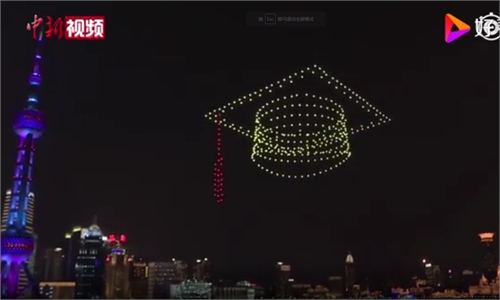Chinese tech giants aim high in creating a version of 'metaverse'
ByteDance, Tencent aim high in creating a Chinese version of virtual reality universe

A man using virtual reality equipment Photo: VCG
The word "metaverse" may still a new concept for the general public, but it's already a project high on agenda of many big tech firms around the world ranging from US' Facebook, Microsoft, to China's ByteDance and Tencent.
Tech firms are in the early stages of a global arms race to create a virtual reality universe, placing big bets that this technology could define the future of the internet.
The so-called metaverse is widely understood as an alternate digital reality where people work, play, and socialize. According to the definition published on Wikipedia, the metaverse is a collective virtual shared space, created by the convergence of virtually enhanced physical reality and physically persistent virtual space, including the sum of all virtual worlds, augmented reality, and the internet.
The word "metaverse" is made up of the prefix "meta" (meaning beyond) and the stem "verse" (a back-formation from "universe"); the term is typically used to describe the future iteration of the internet, made up of permanent, shared, 3D virtual spaces linked into a perceived virtual universe.
Industry players told the Global Times that the global increase in attention on the metaverse is in part based on people's demand for entertainment experience and improvement in life efficiency, and on the other hand, the rapid development of 5G, AI, blockchain technology and VR/AR display technology is also helping populating the concept.
Moreover, the 2020 epidemic is undoubtedly an accelerator. People's life scenes are shifting more from offline to online. This "forced" transformation has instead made everyone think, discuss and pay more attention to the embryonic form of the future meta-universe.
On a Facebook earnings call in July, CEO Mark Zuckerberg mentioned metaverse 16 times, according to a report from the Wall Street Journal. He said Facebook should be known as a "metaverse company."
Intel, Unity Software, Microsoft and Nvidia also frequently referred to the so-called metaverse throughout 2020.
Recent developments show that this new wave of technology is coming much faster-than-expected speed.
Nvidia on August 10 has announced a major expansion of NVIDIA Omniverse - the world's first simulation and collaboration platform that is delivering the foundation of the metaverse - through new integrations with Blender and Adobe that will be open to millions of users.
"Nvidia Omniverse connects worlds by enabling the vision of the metaverse to become a reality," said Richard Kerris, vice president of the Omniverse development platform at Nvidia. "With input from developers, partners and customers, we're advancing this revolutionary platform so that everyone from individuals to large enterprises can work with others to build amazing virtual worlds that look, feel and behave just as the physical world does."
Chinese vanguard
Chinese forces, meanwhile, are rushing into the metaverse space.
Gaming unicorn Roblox, known a leader in the metaverse, and Tencent has announced earlier in 2019 a strategic partnership to help fuel the next generation of Chinese creators. Roblox and Tencent have secured a license to launch the Roblox gaming platform in China.
"Roblox's vision for the metaverse is to create a platform for immersive co-experiences, where people can come together within millions of 3D experiences to learn, work, play, create, and socialize. Fostering a rich community built on shared experiences is central to this vision and a driving force for Roblox's path forward," Roblox said in a blog article it posted on Thursday.
ByteDance, owner of the short-video app TikTok, has increased its investment in Roblox competitor Reworld by nearly 100 million yuan ($15.3 million), according to a report from the South China Morning Post in April, citing people familiar with the matter, as the company seeks its own so-called metaverse platform in its escalating rivalry with video game giant Tencent.
"Apart from leading players, there are already start-ups engaging in the field in China," Zhao Dan, a close follower of the XR industry, told the Global Times on Sunday.
Zhao said Chinese firms have strong software development capabilities, and the hardware gap is not big compared with their foreign counterparts, so this time, Chinese team could have a possibility of leaping ahead in creating a metaverse rather than being only a follower in PC and mobile internet era.
Zhao predicted that unlike Facebook which may look at global market from the beginning, Chinese leading players like ByteDance and Tencent may likely to create their own platforms, starting from the domestic market, then aiming for the overseas.
Nevertheless, at this stage, the metaverse is at its infancy, and may not as immersive as described above, but a little prototype has made people feel that the future is promising and boundless, an industry insider surnamed Zheng, told the Global Times.
Zheng said so far, some initial metaverse products produced by Roblox and Decentraland have some basic experience, and years of technical development needed before the vision in the 2018 sci-fi film Ready Player One would become a reality.
The infrastructure of metaverse includes a large varieties from 5G communication network, VR, AR, WIFI6, wearable devices, blockchain, cloud computing, edge computing and AI+GPU, analysts said, noting that blockchain, VR, and brain-computer technology that are necessary in the metaverse are still being built, and cannot support the ideal metaverse ecology.
Moreover, the metaverse is not just a game, and it's a set of application scenarios not just focused on entertainment, but also for socializing, studying, working, shopping, watching dramas, exhibitions, sports, and even investment and financial management on the platform, a parallel digital world, Zheng said.
"Thus, no giant or individual can build such a meta-universe on its own, only through cooperation, can the vision be achieved," Zheng said.


